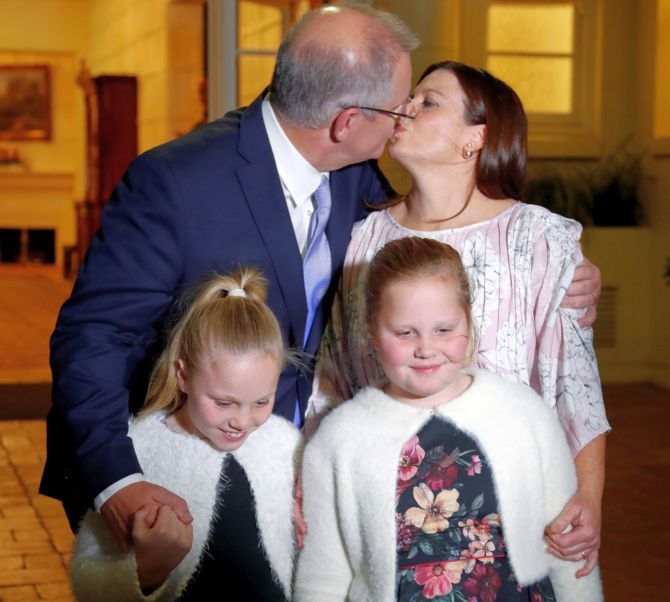Scott Morrison on Friday became Australia’s new prime minister after emerging victorious in a leadership contest for the Liberal Party following a political coup against Malcolm Turnbull, ending days of political chaos in the country.

Morrison, 50, who has been serving as the country’s treasurer, defeated former home affairs minister Peter Dutton by 45 votes to 40 at the closed- door leadership vote.
The vote was the second challenge this week to the leadership of Turnbull -- who himself assumed office by leading a party revolt in 2015.
Morrison is the sixth prime minister of Australia in just over 10 years.
Turnbull stepped down after receiving a petition from a majority of Liberal lawmakers demanding a ballot to select a new leader.
Morrison will lead the conservative party, which is known as the Liberal Party, in a general election expected in the coming months.
The governor-general, Peter Cosgrove, sworn-in Morrison as the 30th prime minister of Australia.

Morrison promised to “bring the Parliament back together.”
“We’re an optimistic, we are a passionate, and we are an ambitious people, full of aspiration for ourselves, our families, and for our great nation,” Morrison said.
He had backed Turnbull, 63, earlier in the week, but he later emerged as a more moderate alternative to Dutton, known for his hard-line stance on immigration.
Turnbull thanked the Australian people and listed his achievements including tax cuts, same-sex marriage and jobs growth.
He said his successor had been a very loyal and effective treasurer.
The outgoing prime minister lashed out at the wreckers he said had created chaos.
He said there had been a determined insurgency trying to, “if not bring down the government, then bring down my prime ministership”.
“I was impressed by how many of my colleagues spoke or voted for loyalty above disloyalty, how the insurgents were not rewarded,” he said.

Turnbull said he would be leaving Parliament very soon, which means there will be a by-election for his Sydney seat of Wentworth.
After being defeated, Dutton said he would provide “absolute loyalty” to Morrison.
“To make sure we win the election, that we defeat Bill Shorten to make sure that he’s never prime minister,” Dutton said.
Dutton had mounted an unsuccessful leadership challenge on Tuesday.
A rift within the party escalated last weekend over an energy proposal from the prime minister, which was meant to reduce electricity prices and address climate change by cutting emissions. Dutton rallied the party’s conservative wing against Turnbull.
The deputy leader Julie Bishop, who has been serving as foreign minister, also lost her position to Victorian Josh Frydenberg who defeated Greg Hunt and Steve Ciobo with an absolute majority.
The past decade in Australian politics has been marked by a series of leadership coups, with three other sitting prime ministers deposed by party rivals. Since 2007, no Australia prime minister has faced two consecutive elections.
Under the Australian system, as in India, the prime minister is not directly elected by voters but is the leader of the party or coalition that can command a majority in parliament.
But in recent years, prime ministers unpopular in the polls -- or with their colleagues -- have been swiftly sacrificed from within.









